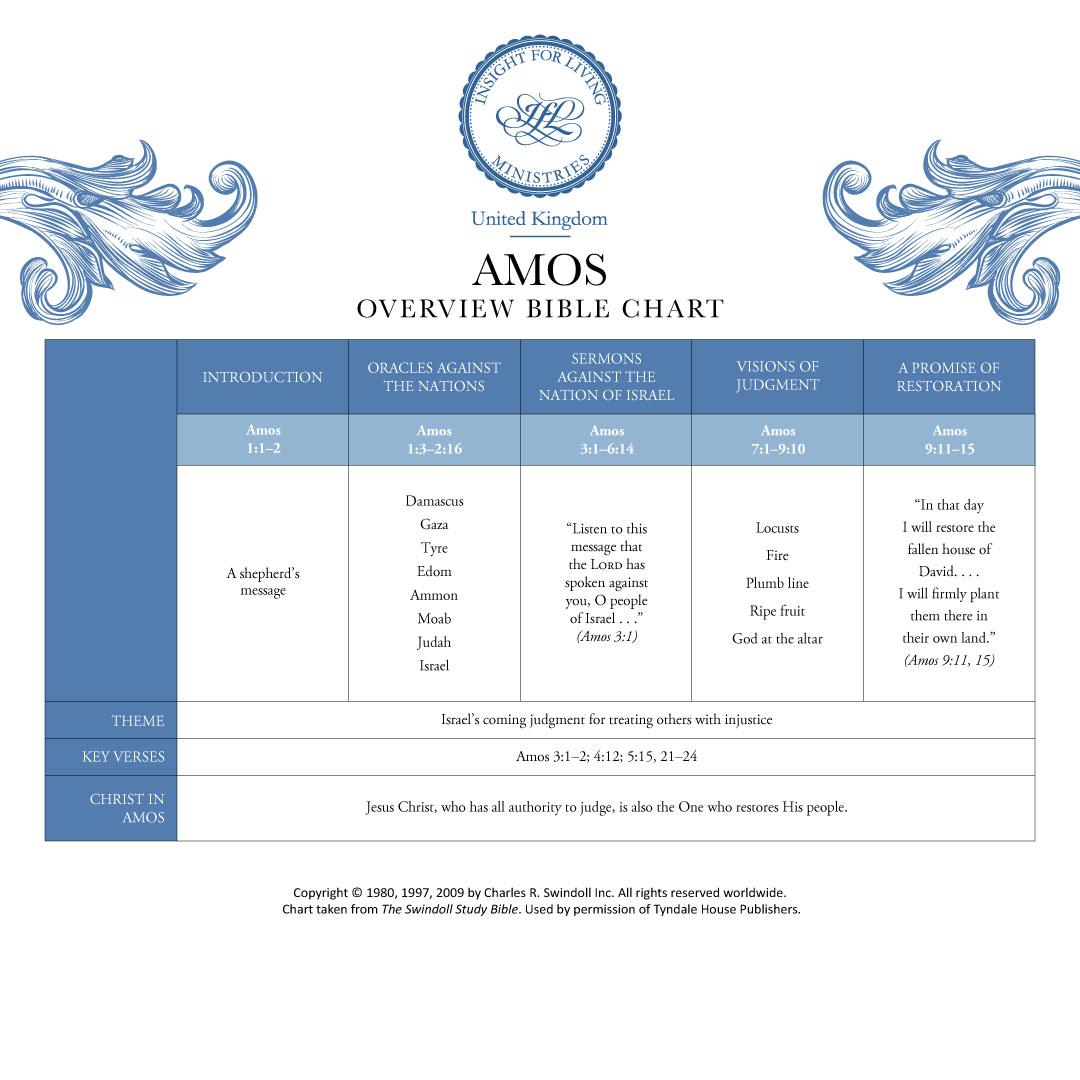
Listen to Chuck Swindoll’s overview of Amos in his audio message from the Classic series God’s Masterwork.
Who wrote the book?
The prophet Amos lived among a group of shepherds in Tekoa, a small town approximately ten miles south of Jerusalem. Amos made clear in his writings that he did not come from a family of prophets, nor did he even consider himself one. Rather, he was “a grower of sycamore figs” as well as a shepherd (Amos 7:14–15). Amos’s connection to the simple life of the people made its way into the center of his prophecies, as he showed a heart for the oppressed and the voiceless in the world.

View Chuck Swindoll's chart of Amos, which divides the book into major sections and highlights themes and key verses.
Where are we?
Amos prophesied “two years before the earthquake” (Amos 1:1; see also Zechariah 14:5), just before the halfway point of the eighth century BC, during the reigns of Uzziah, king of Judah, and Jeroboam, king of Israel. Their reigns overlapped for fifteen years, from 767 BC to 753 BC.
Though he came from the southern kingdom of Judah, Amos delivered his prophecy against the northern kingdom of Israel and the surrounding nations, leading to some resistance from the prideful Israelites (Amos 7:12). Jeroboam’s reign had been quite profitable for the northern kingdom, at least in a material sense. However, the moral decay that also occurred at that time counteracted any positives from the material growth.
Why is Amos so important?
Amos was fed up. While most of the prophets interspersed redemption and restoration in their prophecies against Israel and Judah, Amos devoted only the final five verses of his prophecy for such consolation. Prior to that, God’s word through Amos was directed against the privileged people of Israel, a people who had no love for their neighbor, who took advantage of others, and who only looked out for their own concerns.
More than almost any other book of Scripture, the book of Amos holds God’s people accountable for their ill-treatment of others. It repeatedly points out the failure of the people to fully embrace God’s idea of justice. They were selling off needy people for goods, taking advantage of the helpless, oppressing the poor, and the men were using women immorally (Amos 2:6–8; 3:10; 4:1; 5:11–12; 8:4–6). Drunk on their own economic success and intent on strengthening their financial position, the people had lost the concept of caring for one another; Amos rebuked them because he saw in that lifestyle evidence that Israel had forgotten God.
What's the big idea?
With the people of Israel in the north enjoying an almost unparalleled time of success, God decided to call a quiet shepherd and farmer to travel from his home in the less sinful south and carry a message of judgment to the Israelites. The people in the north used Amos’s status as a foreigner as an excuse to ignore his message of judgment for a multiplicity of sins.
However, while their outer lives gleamed with the rays of success, their inner lives sank into a pit of moral decay. Rather than seeking out opportunities to do justice, love mercy, and walk humbly, they embraced their arrogance, idolatry, self-righteousness, and materialism. Amos communicated God’s utter disdain for the hypocritical lives of His people (Amos 5:21–24). His prophecy concludes with only a brief glimpse of restoration, and even that is directed to Judah, rather than the northern kingdom of Israel (9:11–15).
How do I apply this?
Injustice permeates our world, yet as Christians we often turn a blind eye to the suffering of others for “more important” work like praying, preaching, and teaching. But the book of Amos reminds us that those works, while unquestionably central to a believer’s life, ring hollow when we don’t love and serve others in our own lives. Do you find yourself falling into that trap at times—prioritizing prayer over service?
The prophecy of Amos should simplify the choices in our lives. Instead of choosing between prayer and service, the book of Amos teaches us that both are essential. God has called Christians not only to be in relationship with Him but also to be in relationships with others. For those Christians whose tendency has been to focus more on the invisible God than on His visible creation, Amos pulls us back toward the center, where both the physical and the spiritual needs of people matter in God’s scheme of justice.
Related Articles
Does God Hate?
Hate is a powerful word. We are taught from childhood to avoid hatred at all costs and to obey the command of Christ to love everyone, including our enemies. So it’s shocking to read the words that Paul quoted from Malachi, who declared that God loved Jacob but hated Esau (Malachi 1:2–3). How can a […]
Read More→Famine
The word hangs like an awful omen in our heads. Mentally, we picture brutal, grotesque images. Cow’s ribs and hips protrude. Babies’ eyes are hollow. Bloated stomachs growl angrily. Skin stretches across faces tight as a trampoline. The outline of the skull slowly emerges. Joints swell. Grim, despairing stares replace smiles. Hope is gone . […]
Read More→Spiritual Leadership
Leadership is influence. To the extent we influence others, we lead them. Lord Montgomery implied this when he wrote . . . Leadership is the capacity and will to rally men and women to a common purpose, and the character which inspires confidence. We could name many great people who did just that, whether they […]
Read More→Understanding Our Troubled Times
Don’t you sometimes just shake your head and wonder, What on earth is happening in the world? Over the course of my lifetime, I have witnessed numerous changes in the broader culture. Unfortunately, not all have been for good. If Christians hope to make an impact in this world, it’s imperative that we first understand […]
Read More→